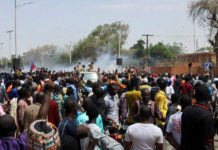Only seven African nations, most of them small, are likely to meet the World Health Organization’s goal that each country across the world be able to vaccinate 10 percent of its people against the coronavirus by September, the agency said on Thursday. It is a dire prospect for a continent where vaccine supplies are being quickly depleted, and governments are battling a resurgence in infections.
The global health body said inoculation coverage remained at about 2 percent continentwide — and about 1 percent in sub-Saharan Africa — even as some rich nations across the world administered shots to a majority of their people. To achieve the 10 percent target for each country on the continent, Africa would need an extra 225 million doses, said Dr. Matshidiso Moeti, the W.H.O. regional director for Africa. In total, nine of out of 10 African nations will miss out on this global vaccination goal, the agency estimated.
The seven countries are Seychelles, Morocco, Mauritius, Equatorial Guinea, Comoros, Sao Tome and Principe, and Zimbabwe. An additional six countries — Tunisia; Ghana; Eswatini, formerly known as Swaziland; Lesotho; Rwanda; and Kenya — could reach the target if they receive enough supply to keep up with their current pace of vaccination, the W.H.O. said.
“This will really require a massive effort,” Dr. Moeti admitted, saying that “without a significant boost” in the availability of vaccines, “many African lives are at stake.”
The announcement came as Africa is set to surpass five million virus cases, with Covid having claimed 133,000 lives so far. While testing is often limited in the countries on the continent, known cases have also increased, with 94,145 new ones reported in the past week — a 26 percent increase from the previous week — according to the Africa Centers for Disease Control and Prevention.
Countries including Egypt, South Africa, Tunisia and Zambia have reported a surge in cases, while some, like Uganda, reintroduced lockdowns to stem the spread of the virus. The Africa C.D.C. also said deaths on the continent increased by 2 percent over the past week, and many more countries have reported detecting the variants first reported in South Africa, Britain and India.
And just as cases and deaths rise, many African nations have reported exhausting most of the vaccines they received through Covax, a global vaccine initiative. The W.HO. said that 14 African nations have utilized between 80 percent and 100 percent of their doses.
Still, only 35.9 million Covid vaccine doses have been administered in the continent, the Africa C.D.C., with the majority given in a few countries, including Morocco, Egypt, Nigeria, Ethiopia and South Africa, and in the Western Sahara region. Tanzania, Eritrea and Burundi have yet to give a single shot while Togo and Chad only started administering jabs last week.
While some countries faced shortages, others were not rolling out campaigns quickly. Twenty nations have used less than half of their doses, the W.H.O. estimated, while 12 nations have more than 10 percent of their doses facing expiration.
But on Thursday, both the W.H.O. and the Africa C.D.C. welcomed the news that President Biden has decided to donate 500 million Pfizer-BioNTech vaccines to poorer nations, including those in the African Union. Countries like France and corporations like Mastercard have also promised to finance, deliver or help produce Covid vaccines in the continent.
“It’s a monumental step forward,” Dr. Moeti said of the U.S. effort, which Mr. Biden announced in Europe on Thursday. “We are now seeing wealthy nations begin to turn promises into action. The hope of a shared future without Covid-19 is starting to shine a little bit more brightly.”
The vaccines are set to start shipping in August, with 200 million doses set for delivery by the end of this year, while the other 300 million will be delivered early next year, according to a White House fact sheet.
Dr. John Nkengasong, the director of the Africa C.D.C., welcomed the decision but said he did not know when or how many vaccines Africa would receive. But he urged member states to prepare storage facilities for the Pfizer vaccine and prioritize big cities once those doses arrive. He gave the example of Rwanda, which he said had received over 102,000 doses of Pfizer and quickly rolled it out.
“We have to use a combination of vaccines to win this battle against Covid-19,” Mr. Nkengasong said in a news conference on Thursday. “We are at war and you go to war with what you have, not what you need.”
Source : Nytimes













